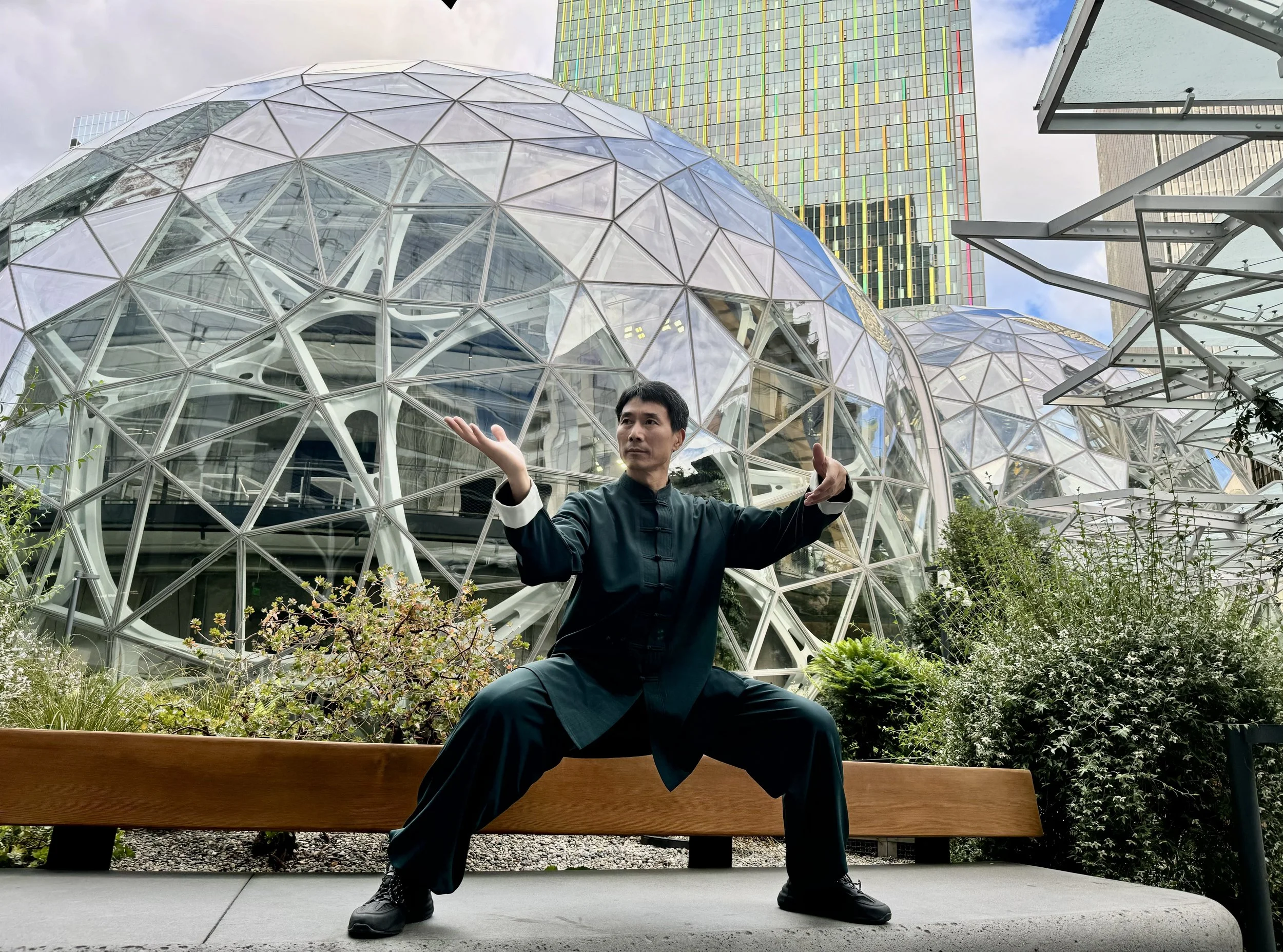“A student asks Chen Bing, “What are you working on?”
Chen Bing replies, “The Mind.””
This June the Moon welcomed Master Chen Bing back to Seattle. The seminar was a huge success. Master Chen was the first of the Chen Family to visit Seattle since the Pandemic. And he was a perfect choice. He is kind and fun to be around and always smiling. I told my students in preparation for our event, there really is no one like Chen Bing. He has cultivated and exquisitely conveys the core principle of Taijiquan: Fang Song. It is evident this is the source of his ease.
Fang Song is translated roughly as "relax" yet it really means much more than we might think. Fang Song is an active, intentional process by which we systematically loosen and let go. We soften and lengthen our tendons and muscles, smooth our breath and calm our minds. By practicing fang song we are able to become more acquainted with our inner selves. We find ways to release held patterns. When one gets the hang of it, one feels a sense of heaviness. Our body is feeling only itself, rooted and connected to its boney architecture and to the earth, instead of to all the tension we carry, which keeps us uprooted and less stable. In fact, I noticed as the workshop progressed, this heaviness allowed more active recruitment of my muscles. The load bearing increased, just by standing and relaxing. It’s funny to experience become stronger by doing nothing. We all gained better balance too; we became more focused and calmer. And we had more energy because there was less tension to block it.
Both morning and afternoon sessions started with Chen Bing’s signature 45-minute relaxation set. Yes, they are defined movements, but with gobs of cues to ‘relax’ and become ‘heavy.’ He peppered the instruction of the movements with very helpful explanations and demonstrations of the principles. He himself is so skilled at fang song, it was easy to slip into his wake and find oneself starting to release. We had plenty of form instruction time too, always infused with “drop your arms,” “joint by joint,” “heavy…”. Chen Bing gave us ample demonstrations; one could see the power and elasticity that a life of this type of practice engenders.
I enjoyed talking with students about their experiences after the workshop. Without exception each person reflected about how potent the relaxation focus was for them. For me it was all about my neck. Truth be told it was a dance between allowing my head to be heavy enough to release my neck and resisting that process. Relaxation is not having an adult beverage and flopping on the couch, it is finding ways to let go of stored tension. But first you must feel it.
And feel I did. In the process of letting my head be heavy I had an unexpected emotional response. As I was dancing with my neck, tears came. This took me by surprise to be honest. As I stayed with it, the awareness of all that has happened in my personal life over these past few years flooded to the fore. The Pandemic, the death of my mother and one of my closest friends, my husband’s serious health issues, my own health issues, the relentless crisis management of it all and the very real stresses of our national and global situation. Even though finding creative ways to support my students, my community and myself was a respite, it was still a lot to manage. No wonder my neck was pissed off.
As I connected with the truth of my tension, I realized it was not the muscles that needed to let go, it was the trauma and fear and rage and grief and memory of my experiences that I had to let go of. If my neck would ever stand a chance, I had to let go.
Over the next few minutes, I became relieved I was at this point. If I let it go, I would be ok. If I didn’t move through my world stuffing back all that, I would be ok. I also became curious how much stored trauma was in my physical body, not just from these past few years, but perhaps for decades, and how my life, my body/mind/temperament might be shaped differently if I let go of those layers too. I’m going to investigate further.
I’ve been sharing this experience in classes over the past couple weeks. It feels quite vulnerable to do but I notice many heads nodding as I do and emails after thanking me. At the same time, I think we all recognize that letting go of tension presents some risks. The vulnerability of moving in the world without a certain amount of physical and mental armor is real, isn’t it? So now Tai Chi tells us to let it go? Then what? How do we navigate the risk of relaxing? Truthfully, I have no idea. All I know is I do not want to live with that type of tension in my neck and I’m willing to take a risk to let it go.
I’m very appreciative of Chen Bing and his time here. I’m also very grateful for a Tai Chi and Qigong practice that offers an opportunity to investigate relaxation on our own terms, within a container that is safe. Relaxation can help our health, our relationships, our martial arts and especially our mind. In a world I find not very relaxed, it is a powerful gift to know that many other people are looking for their fang song too. May we all find ways to inhabit ourselves in a relaxed way.
***
Chen Bing’s Six Points of Relaxation:
Relax your eyes, Relax your neck, Relax your back, Relax your dantian, Relax your breathing, relax your feet. And, number seven: Whole body together.

